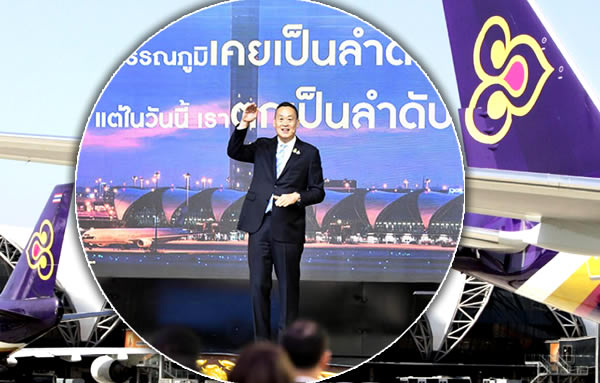In a significant development for Thai Airways International (THAI), the airline’s labor union is pushing back against government intervention in its rehabilitation strategy. As THAI aims to emerge from bankruptcy, tensions are rising over a proposal to bring in government officials, which the union argues could jeopardize the airline’s recovery efforts and autonomy. Here’s a closer look at the evolving situation and what it means for the future of Thailand’s national carrier.
Thailand’s THAI Union Battles to Keep Government Out of Airline Rehabilitation Plan
THAI Union’s Protest Against Government Involvement
On November 8, THAI employees gathered in protest outside the airline’s Bangkok headquarters, voicing opposition to proposed amendments to THAI’s rehabilitation plan. Displaying placards, the union urged creditors to reject changes that they believe could compromise the airline’s independence.
Concerns Over Government Intervention in THAI’s Future
The Thai Finance Ministry has suggested appointing two officials, Polchak Nimwatana and Panya Chupanich, to THAI’s rehabilitation team. The union fears that this move may lead to political influence in crucial decisions, especially regarding aircraft purchases, and ultimately damage THAI’s competitive edge on the global stage.
Union’s Stand on the Government’s Influence
In a powerful statement, the union argued that “political interference and corruption” have been detrimental to the airline’s performance. They emphasized that employees, having dedicated years to the airline, are best suited to oversee its successful recovery without external interference.
The Proposed Changes and Their Implications
The Thai government’s plan to appoint two ministry officials to the rehabilitation team has sparked controversy, not only among union members but also some creditors.
The Role of New Government Appointees in THAI’s Recovery
Under the government’s proposal, new appointees would have a say in THAI’s rehabilitation strategy, potentially involving debt-to-equity conversions, adjustments to capital structure, and even policy decisions on asset acquisitions. This has raised concerns among analysts, who worry that government influence might prioritize state interests over the airline’s operational health and market competitiveness.
A History of Challenges for Thai Airways
THAI filed for bankruptcy in 2019, with approximately 245 billion baht in debt. In 2020, the Thai Cabinet approved a plan under the Bankruptcy Act to help THAI rehabilitate and rebuild its operations. Since then, THAI has implemented various restructuring initiatives, targeting profitability and shareholder returns.
Financial Strategies in THAI’s Rehabilitation Plan
As THAI approaches its mid-2025 recovery target, the restructuring plan includes several key components, including debt repayment options and capital restructuring. This also includes a debt-to-equity conversion for certain creditors, allowing them to become shareholders in THAI.
Debt-to-Equity Conversions and Capital Restructuring
The rehabilitation plan calls for mandatory and voluntary debt-to-equity conversions, with certain creditors offered a conversion rate of 2.54 baht per share. This conversion, slated for the end of 2023, aims to ease the airline’s debt burden, with capital restructuring measures including issuing 9.8 billion new shares.
Banks and Creditors’ Perspective on THAI’s Recovery
Thailand’s leading banks, Bangkok Bank (BBL) and Krungthai Bank (KTB), are among THAI’s creditors and have seen both risks and opportunities in the rehabilitation plan.
Debt Repayment Options for Major Banks
Creditors like BBL and KTB are being given options, such as debt-to-equity conversions and extensions for repayment. Both banks expect a positive outcome if the airline exits rehabilitation, forecasting improvements in their Non-Performing Loan (NPL) ratios.
What Lies Ahead for Thai Airways?
While the union’s protest against government intervention draws attention, THAI’s path to recovery involves numerous stakeholders. Should the Finance Ministry’s proposal be accepted, the airline may see more direct government involvement in the coming years, shaping both financial decisions and the airline’s strategic vision.
THAI’s 2025 Exit Target
Thai Airways aims to exit the rehabilitation process by mid-2025, marking a major milestone in its journey toward financial stability. With an eye on increasing shareholder equity, the airline hopes to restore its position on the Stock Exchange of Thailand (SET) and resume trading by June 2025.
Conclusion
The battle over Thai Airways’ future reflects broader concerns about political influence in corporate recovery efforts. While the Thai government aims to safeguard the airline’s financial future, THAI’s labor union and analysts argue that independence is key to ensuring a sustainable recovery. As THAI moves closer to a mid-2025 rehabilitation exit, the airline’s fate rests on achieving a delicate balance between government support and operational autonomy.
Ref-Thaiger









